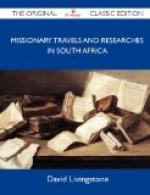After crossing the Lonaje, we came to some pretty villages, embowered, as the negro villages usually are, in bananas, shrubs, and manioc, and near the banks of the Leeba we formed our encampment in a nest of serpents, one of which bit one of our men, but the wound was harmless. The people of the surrounding villages presented us with large quantities of food, in obedience to the mandate of Shinte, without expecting any equivalent. One village had lately been transferred hither from the country of Matiamvo. They, of course, continue to acknowledge him as paramount chief; but the frequent instances which occur of people changing from one part of the country to another, show that the great chiefs possess only a limited power. The only peculiarity we observed in these people is the habit of plaiting the beard into a three-fold cord.
The town of the Balonda chief Cazembe was pointed out to us as lying to the N.E. and by E. from the town of Shinte, and great numbers of people in this quarter have gone thither for the purpose of purchasing copper anklets, made at Cazembe’s, and report the distance to be about five days’ journey. I made inquiries of some of the oldest inhabitants of the villages at which we were staying respecting the visit of Pereira and Lacerda to that town. An old gray-headed man replied that they had often heard of white men before, but never had seen one, and added that one had come to Cazembe when our informant was young, and returned again without entering this part of the country. The people of Cazembe are Balonda or Baloi, and his country has been termed Londa, Lunda, or Lui, by the Portuguese.
It was always difficult to get our guides to move away from a place. With the authority of the chief, they felt as comfortable as king’s messengers could, and were not disposed to forego the pleasure of living at free quarters. My Makololo friends were but ill drilled as yet; and since they had never left their own country before, except for purposes of plunder, they did not take readily to the peaceful system we now meant to follow. They either spoke too imperiously to strangers, or, when reproved for that, were disposed to follow the dictation of every one we met. When Intemese, our guide, refused to stir toward the Leeba on the 31st of January, they would make no effort to induce him to go; but, having ordered them to get ready, Intemese saw the preparations, and soon followed the example. It took us about four hours to cross the Leeba, which is considerably smaller here than where we left it—indeed, only about a hundred yards wide. It has the same dark mossy hue. The villagers lent us canoes to effect our passage; and, having gone to a village about two miles beyond the river, I had the satisfaction of getting observations for both longitude and latitude—for the former, the distance between Saturn and the Moon, and for the latter a meridian altitude of Canopus. Long. 22d 57’ E., lat. 12d 6’ 6” S.




